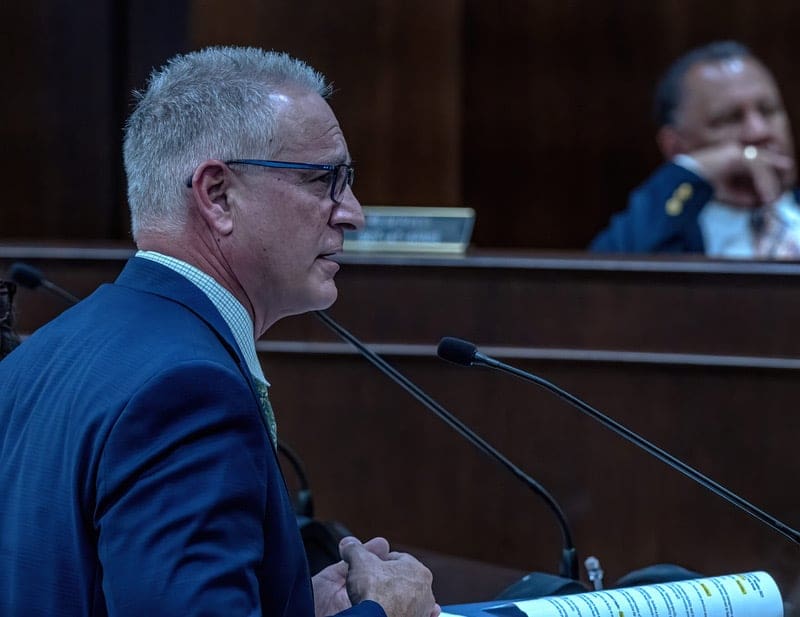“They’re popping champagne corks for the last two weeks because they think their stocks are going up,” Democratic Rep. John Ray Clemmons said Wednesday of private prison company CoreCivic. (Photo: John Partipilo)
Tennessee’s correction commissioner continued to defend the state’s private-prison operator as a “good partner” Wednesday while one lawmaker blasted him for whitewashing CoreCivic amid reports of deaths, drug use and a federal civil rights investigation.
“What have they done about it? Nothing,” Democratic state Rep. John Ray Clemmons said to Correction Commissioner Frank Strada. “They’re popping champagne corks for the last two weeks because they think their stocks are going up because of an influx in the prison population.”
Publicly-traded stock in Brentwood-based CoreCivic rose 31.6% following the presidential election win by Donald Trump, who is promising to detain and deport millions of immigrants. Tennessee’s “truth-in-sentencing” law combined with the end of “sentence reduction credits,” parole board changes and a pending constitutional amendment giving judges authority to decline bail for a litany of crimes are expected to make prison populations grow as well.
CoreCivic CEO Damon Hininger, who is making overtures toward a gubernatorial run in two years, has detailed how those policy changes strengthen the company’s financial standing.
In back-and-forth questioning Wednesday of Strada at a Government Operations subcommittee meeting, Clemmons said it is “crazy” for the state to keep shoveling hundreds of millions of dollars into a private corporation that’s forced to pay Tennessee millions of dollars in civil penalties for failing to meet contractual requirements.
Clemmons said he believes the state is dumping its “problems” on CoreCivic and that the Correction Department and private company are violating the “spirit” of a state law that prohibits Tennessee from having more than one privately-run prison.
The state uses a loophole in the law to contract with CoreCivic to operate Trousdale Turner Correctional Facility in Trousdale County while three other privately-run prisons are handled through contracts with Hardeman County and Wayne County.
Correction officials said such a setup is allowed under state law, and Strada tresponded to Clemmons by saying he doesn’t believe the state is putting its “problems” on CoreCivic. Strada said the state has monitors who check CoreCivic facilities to see whether they have enough officers to oversee inmates.
If they fall short, the state penalizes the company with liquidated damages. The company has foregone $29.5 million since 2022.
Trousdale Turner is under a federal civil rights probe for assaults, murders and understaffing at the facility since it opened in 2016. It has been fined for improper prison counts, problems with solitary confinement, poor staffing and accusations that guards used excessive force.
The company sustained a 146% turnover rate in 2023 because of difficulty hiring correctional officers, which made it harder to monitor prisoners and avert safety risks.
The state, though, increased its payout to CoreCivic by $7 million last year and is requesting $6.8 million more for next fiscal year, which would drive its annual payout to $244.5 million.
Strada discounted the complaints about CoreCivic and Trousdale Turner by saying the turnover rate is inflated because the company sends teams from across the nation to handle security during staffing shortages.
“I stand by my comments about the partnership,” Strada said.
The commissioner also touted a computer tablet program for inmates that allows them to send email to family members, watch movies, listen to music and log in to job training programs. Correction officials said the program is not connected to the Internet but is contained within the prison, even though the tablets have cellular connections that enable them to send email to certain phone numbers.
Strada did not immediately have information on the contract for the tablets but said the program is “revenue-based.” Inmates pay a provider to use the tablets.
The department was required to come back before the Legislature’s Government Operations subcommittee because of a poor audit it received in 2023.
Strada told lawmakers the state’s vacancy rate fell to 26% from 47%, in part because of aggressive advertising campaigns designed to attract officers. He also said the state spent $12 million more for body armor, metal detectors and other methods to stop drugs and weapons from being smuggled into prisons.
Tennessee Lookout: YOU MAKE OUR WORK POSSIBLE.
This article was originally published on Tennessee Lookout under a Creative Commons license CC BY-ND 4.0. Learn more about third-party content on ZanyProgressive.com.





